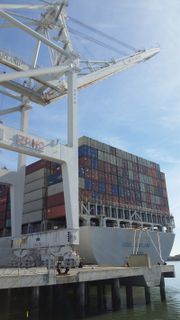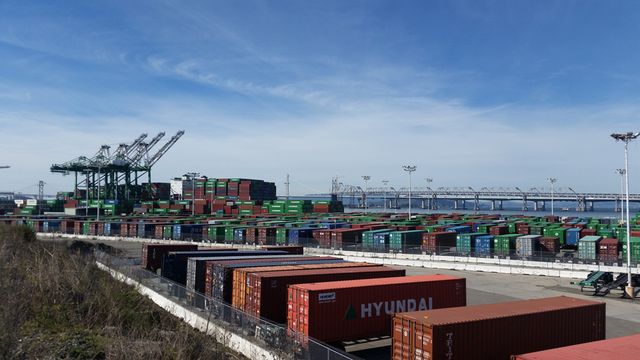Jerry White
The Pacific Maritime Association, which represents cargo carriers, terminal operators and stevedoring companies, has imposed a four-day lockout on 20,000 workers at 29 ports along the West Coast of the United States. The docks were closed Thursday and will be shut again on Saturday, Sunday and Monday, following a similar lockout last weekend.
The PMA took the punitive action—which will cost workers hundreds, if not thousands, of dollars in lost regular and overtime wages—in retaliation for an alleged slowdown by the International Longshore and Warehouse Union (ILWU).
“PMA members have concluded that they will not conduct vessel operations on those dates, paying full shifts of ILWU workers such high rates for severely diminished productivity while the backlog of cargo at West Coast ports grows,” the PMA said in a statement.
“This is an effort by the employers to put economic pressure on our members and gain leverage in contract talks,” said ILWU President Robert McEllrath. “The union is standing by ready to negotiate, as we have been for the past several days.”
 A ship waiting to be unloaded
A ship waiting to be unloaded
The PMA canceled talks re-scheduled for Thursday and has not met with the ILWU since February 6. The old labor agreement expired last July 1, but the ILWU has ordered its members to continue working for nine months in hopes of reaching a federally-mediated agreement.
The pleas by the union for some accommodation on management’s terms have only been exploited by the highly profitable companies to go on the offensive. The PMA is reportedly offering a 2.8 percent raise in each year of a new five-year agreement. The association has also pointed to the 40 percent excise tax being imposed on so-called Cadillac health plans, under Obama’s Affordable Care Act, to press for an end to fully paid benefits, something won by dockworkers through generations of struggle.
Like other employers, the PMA is drawing a line in the sand against workers who are seeking to recoup income lost during the longest period of wage stagnation since the Great Depression. They are pressing for even more concessions even as corporate profits and stock markets soar in the sixth year of a so-called recovery.
The lockout occurs as the strike by oil workers nears the end of its second week. Lead bargainer Royal Dutch Shell walked out of talks this week, and negotiations have been suspended at least until February 18. Though the top five Big Oil companies (Shell, ExxonMobil, BP, Chevron and ConocoPhillips) made $90 billion in profits last year despite falling crude prices, they are resisting any demands for improved wages and working conditions.
The companies have responded to the partial strike by the United Steelworkers (USW)—involving only 5,200 of the 30,000 workers in the union—by cutting off the strikers’ health benefits and drawing in managers, contractors and other personnel to maintain production.
The employers are fully backed by the Obama administration and both big business parties. On Thursday, a bipartisan group of congressmen called for a “swift resolution” of the West Coast dispute.
“We believe this is the greatest threat our nation faces right now,” said US Representative Kurt Schrader (D-Oregon), using language normally associated with supposed terrorist threats. Schrader urged Obama—who was in the San Francisco Bay area for a cybersecurity summit Friday—to meet with the head of the PMA and the ILWU, the Los Angeles Timesreported.
In the event of a strike or lockout, the congressmen said, Obama should use the “threat to the national economy” to invoke the Taft-Hartley Act, as President George Bush did in 2002, to reopen the docks.
 Port of Oakland
Port of Oakland
Echoing similar remarks made about the oil strike, White House spokesman Eric Schultz said Thursday that the president was closely monitoring the situation on the docks. He added, “We believe it should be resolved at the negotiating table.”
At this point Obama is relying on the ILWU and USW to contain and ultimately shut down these struggles before they become a catalyst for other sections of workers, including 139,000 GM, Ford and Chrysler workers whose contract expires this September.
If the unions proved incapable, however, Obama and both big business parties would use the repressive powers of the capitalist state—anti-terror laws, militarized police, national guard troops, the FBI, etc.—to try to suppress such a movement.
Since imposing deep pay and benefit cuts on auto workers during the 2009 restructuring of General Motors and Chrysler, the White House has made lowering wages and shifting health care and pension costs from corporations to workers the center of its economic policy.
In doing so, Obama has enjoyed the full collaboration of the United Auto Workers, USW, ILWU and other unions. Obama appointed USW International President Leo Gerard to his corporate competitiveness board in 2013 to cut labor costs in the manufacturing and energy sector.
The unions have done everything possible to suppress working class opposition. The slowdown by the ILWU and the limited walkout called by the USW, including small pickets with no attempt to mobilize broader sections of the working class, are largely ineffectual—and deliberately so.
The unions are allied to Obama and the Democratic Party, having spent decades collaborating with the employers to drive down the living standards of workers. The union executives are just as hostile to a movement by the working class as their corporate masters.
USW President Gerard and ILWU President Robert McEllrath are looking for some cosmetic concession, which they hope will be enough to appease workers and get them to accept yet another concessionary contract. The corporations have responded by calling the unions’ bluff and doubling down: locking out workers, cutting off health benefits and organizing strikebreaking operations, with the federal, state and local governments held in reserve.
At the same time there is a growing mood among workers that they must respond in kind and fight just as determinedly to recoup their years of losses. The re-emergence of such a sentiment is the result of the unprecedented levels of social inequality and the imperviousness of the government, which bails out banks, wages criminal wars and sanctions the looting of society by the corporate and financial elite.
For workers to find a way forward, they must break free from the grip of pro-company unions and build new organizations of struggle controlled by the rank-and-file, to mobilize oil and dockworkers in a powerful strike movement to reverse the erosion of living standards and working conditions. In the face of globally organized shipping and oil companies, workers must reject the nationalism of the unions and fight to unite with their international brothers in a common fight.
Above all, the fight to defend jobs and living standards, just like the fight against dictatorship and war, is a political struggle against Obama, both big business parties and the profit system they defend.
No comments:
Post a Comment